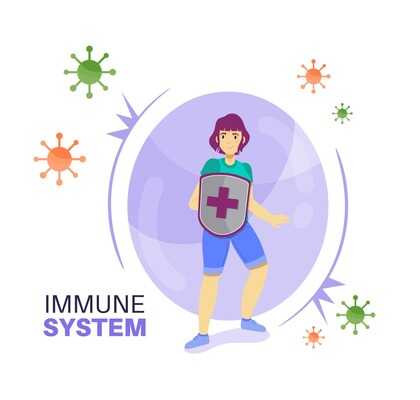It is essential to have a robust immune system to sustain general health and wellbeing. It acts as the body’s defence mechanism, protecting against dangerous pathogens like viruses, bacteria, and parasites. The likelihood of infections and diseases can be decreased by an immune system that can recognise and destroy these invaders. Additionally, it promotes healthy biological activities and helps with tissue healing. On the other hand, a compromised immune system might make a person more vulnerable to illness and slow down the healing process. Therefore, it is essential to put a priority on having a robust immune system by leading a healthy lifestyle that includes a balanced diet, regular exercise, enough sleep, stress management, and refraining from bad habits like smoking and binge drinking.
The immune system is essential for long-term health in addition to its role in acute defence. It preserves immunological memory, allowing the body to react to recurrent infections more efficiently and provide defence against pathogens that have already been encountered.
It is crucial to keep your immune system in good shape if you want to avoid getting sick and promote general wellbeing. Infection risk is decreased by a strong immune system’s effective defence against encroaching microorganisms. In locating and eliminating dangerous bacteria, viruses, and other germs, it is essential. A strong immune system reduces the intensity and duration of diseases and aids in stopping their spread within the body. A person’s ability to fight off illnesses can be strengthened by supporting immune health through good nutrition, consistent exercise, enough sleep, stress management, and other lifestyle choices. This reduces disease susceptibility and improves general health.
- Eat a Nutrient-Rich Diet:
A balanced diet plays a crucial role in supporting immune health and optimal functioning. Foods high in nutrients give the immune system the critical vitamins, minerals, and antioxidants it requires to function properly. The body’s defence against infections is strengthened by getting enough of the vitamins A, C, E, and D as well as minerals like zinc and selenium. A varied range of nutrients is ensured by eating a variety of fruits, vegetables, whole grains, lean meats, and healthy fats. Additionally, eating a balanced diet and keeping a healthy weight help to enhance immunological health. The immune system has to be nourished in order to function properly, fight pathogens, and preserve overall health. This is accomplished through a varied, balanced diet.
Your immune system can benefit from including immunity-boosting, vitamin-rich foods in your diet like citrus fruits and leafy greens. Vitamin C, a powerful antioxidant that improves immune function and encourages the development of white blood cells, is abundant in citrus fruits like oranges, grapefruits, and lemons. Leafy greens like spinach and kale are rich in antioxidants and vitamins A, C, and E, which help shield cells from oxidative stress and support immunological responses. These vitamin-rich foods supply vital elements that boost immunity, enhance ability to fight off illnesses, and advance general health.
Some tips to help you incorporate these foods into your diet:
- Start your day with a vitamin-packed breakfast by adding berries, such as blueberries or strawberries, to your cereal or yogurt.
- Include leafy greens like spinach or kale in your salads, wraps, or stir-fries for a boost of vitamins and antioxidants.
- Snack on citrus fruits like oranges or grapefruits throughout the day, or squeeze fresh lemon juice into your water or herbal tea.
- Add bell peppers, broccoli, or tomatoes to your meals for a dose of immune-boosting vitamins and minerals.
- Use herbs and spices like turmeric, ginger, and garlic in your cooking, as they have immune-boosting properties.
The immune system is significantly supported by regular exercise. Exercise improves circulation, which permits immune cells to move freely throughout the body and boosts their ability to recognise and eliminate invaders. The immune system is strengthened by exercise, which also causes changes in antibodies and white blood cells. Exercise also aids in lowering the production of stress hormones, which can impair the immune system. Regular exercise has been found to lower the risk of chronic illnesses like cardiovascular disease, obesity, and type 2 diabetes that are linked to immune system impairment. To boost your immune system and enjoy the many health advantages of an active lifestyle, aim for at least 150 minutes of moderate-intensity exercise each week.
Some exercises that have been shown to support immune function include:
- Brisk walking : Walking at a brisk pace for 30 minutes a day can increase circulation and help immune cells move throughout the body more efficiently.
- Cycling : Whether indoors or outdoors, cycling is a low-impact aerobic exercise that enhances cardiovascular health, promotes blood flow, and supports immune function.
- Jogging or running : Moderate-intensity jogging or running stimulates the release of endorphins, reduces stress, and strengthens the immune system.
- Swimming : Swimming is a full-body workout that improves cardiovascular fitness and enhances immune function through increased circulation and improved lung capacity.
- Yoga : Practicing yoga reduces stress levels, promotes relaxation, and enhances overall well-being, indirectly benefiting the immune system.
For the immune system to function properly, getting enough sleep is essential. The body releases cytokines as you sleep, which help control immunological reactions. Lack of sleep can interfere with the synthesis of these cytokines, reducing the immune system’s capacity to combat infections and raising the risk of disease. Additionally, sleep encourages the development of immune cells and antibodies that hunt down and eliminate dangerous germs. Additionally, it enables the body to preserve energy and focus resources on immune system operation. To keep your immune system strong and to maximise its capacity to defend against infections, inflammation, and disease, you must consistently receive good sleep.
The recommended sleep duration for adults varies based on age and individual needs. According to the National Sleep Foundation, most adults aged 18-64 require 7-9 hours of sleep per night for optimal health and well-being. However, individual variations exist, and some adults may function well with slightly less or more sleep. It’s important to prioritize sleep and establish a consistent sleep schedule that allows for adequate rest. Quality of sleep is equally important as quantity, so creating a sleep-friendly environment, practicing relaxation techniques, and maintaining a regular sleep routine can contribute to achieving the recommended sleep duration and promoting overall health.
Some tips to help you achieve better sleep:
- Maintain a consistent sleep schedule: Go to bed and wake up at the same time every day, even on weekends, to regulate your body’s internal clock.
- Create a sleep-friendly environment: Ensure your bedroom is dark, quiet, and at a comfortable temperature to promote relaxation and uninterrupted sleep.
- Limit exposure to screens before bed: The blue light emitted by electronic devices can disrupt sleep. Avoid screens for at least an hour before bedtime.
- Practice relaxation techniques: Engage in activities like reading, taking a warm bath, or practicing meditation or deep breathing to calm your mind and prepare for sleep.
- Limit caffeine and alcohol intake: Avoid consuming caffeine or alcohol close to bedtime, as they can interfere with sleep quality and disrupt sleep patterns.
The immune system may be significantly impacted by long-term stress. Long-term stress results in the generation of stress hormones like cortisol, which can impair immunological function. As a result, there may be a reduction in the body’s capacity to fight against infections and an increase in disease susceptibility. Chronic stress causes the body to become inflamed, which can further impair the immune system. Stress can also interfere with sleep, which has a bad effect on the immune system. Overall, persistent stress can dysregulate the immune system, impede optimal performance, and raise the risk of a number of health issues. Maintaining a robust immune system requires effective stress management through relaxation exercises, physical activity, and healthy coping mechanisms.
Some effective stress management techniques:
- Meditation: Practicing mindfulness meditation can calm the mind, reduce stress, and enhance mental clarity.
- Deep breathing exercises: Deep, diaphragmatic breathing activates the body’s relaxation response, helping to alleviate stress and promote a sense of calm.
- Physical exercise: Engaging in regular exercise releases endorphins, improves mood, and reduces stress levels.
- Progressive muscle relaxation: This technique involves tensing and then relaxing different muscle groups to promote relaxation and release tension.
- Social support: Talking to trusted friends or family members about stressors can provide comfort, support, and valuable insights.
Self-care activities are essential for lowering stress and preserving general wellbeing. Self-care entails nourishing and looking after one’s physical and emotional needs. Self-care can help people efficiently manage their stress levels. Exercise, meditation, hobbies, time spent in nature, mindfulness exercises, getting adequate sleep, and maintaining a healthy diet can all help one feel refreshed and relaxed. Self-care practises help to refuel and replenish energy reserves, enhance mood, and foster a sense of value. The quality of a person’s life can be increased overall by prioritising self-care. This will help people manage stress, build resilience, and live better.
Maintaining proper hydration is essential for maintaining immunological function. Since water aids in the body’s transportation of nutrients, oxygen, and immune cells, it is crucial for the immune system to work properly. It helps with the creation of lymph, which transports immune cells like white blood cells. It also aids in maintaining the health of mucous membranes, which serve as a defence against microorganisms. Additionally, maintaining hydration helps the body remove toxins and waste products, lessening the strain on the immune system. It is advised to consume enough water each day to support healthy immune function and sustain optimum hydration.
Tips for staying hydrated throughout the day:
- Carry a water bottle: Keep a reusable water bottle with you at all times to make it convenient to drink water throughout the day.
- Set reminders: Use alarms or smartphone apps to remind yourself to drink water at regular intervals.
- Infuse your water: Add natural flavors to your water by infusing it with slices of fruits like lemon, cucumber, or berries.
- Drink herbal tea or flavored water: Enjoy herbal teas or flavored water options to increase your fluid intake while adding variety to your beverages.
- Eat hydrating foods: Include fruits and vegetables with high water content, such as watermelon, cucumber, and lettuce, in your diet.
Consuming immune-boosting beverages can provide numerous benefits for supporting overall health and strengthening the immune system. Green tea, chamomile, and echinacea tea are a few examples of herbal teas that are full in immune-supporting antioxidants and phytochemicals. They can help reduce inflammation, fight off pathogens, and support immune function. Warm lemon water is another popular immune-boosting beverage that provides vitamin C, antioxidants, and hydration. Vitamin C is known for its role in enhancing immune function and protecting against infections. Regular consumption of these immune-boosting beverages can provide a natural boost to the immune system, improve overall well-being, and contribute to a healthier lifestyle.
Conclusion:
In conclusion, integrating quick and simple strategies to strengthen your immune system is crucial for preserving excellent health. You may support and enhance your immune system by concentrating on important techniques like eating immune-boosting foods high in vitamins like citrus fruits and leafy greens, participating in moderate-intensity physical activity, getting adequate sleep, controlling stress, and practising self-care. These routines support a healthy immune system, strengthen the body’s defences, and lower the chance of sickness. You may proactively safeguard your immune system and advance general well-being by incorporating these behaviours into a healthy lifestyle, which will enable you to prosper and fully appreciate life.







